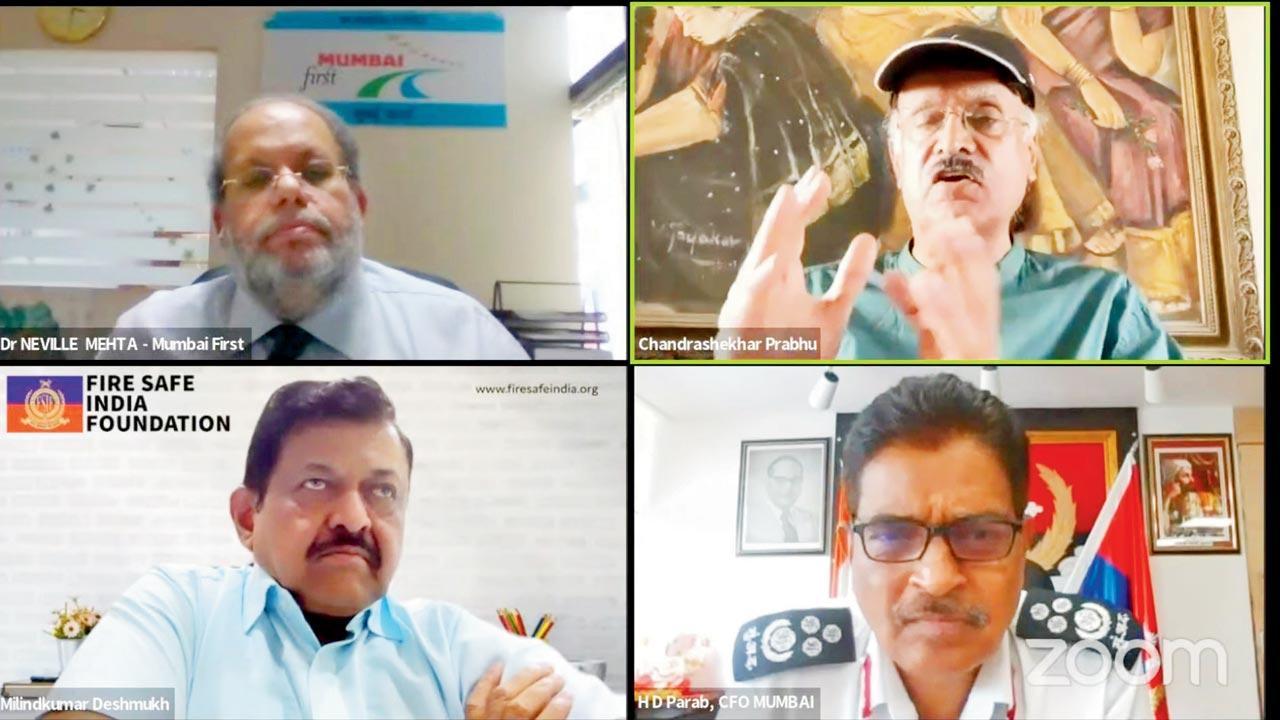Expert panel debates fire safety in megapolis; preaches holistic approach with firefighting woven into plans, projects at inception stage

A screen grab of the virtual panel discussion which included expert panelists (Clockwise) N Mehta, C Prabhu, H Parab and M V Deshmukh
An expert panel dissected fire safety in the city at a virtual panel discussion. The theme was: ‘Transforming Mumbai into a fire safe city’. This panel discussion organised by Mumbai First, was part of National Fire Services Week, marked in India from April 14 to 20. The week is a tribute to 71 firefighters who died fighting a massive fire at the Bombay Dockyard on April 14, 1944.
The session, moderated by Mumbai First Chief Executive Officer (CEO) Neville Mehta began with a welcome address. Mehta told his online audience that they have an “amazing” panel on board for this seminar. There was Hemant Parab, Chief Fire Officer (CFO), Mumbai Fire Brigade, who Mehta said was, “a new generation fire officer with a very progressive outlook on fire safety management.”
M V Deshmukh, panellist, “is full time dedicated to his mission which is a Fire Safe Maharashtra, and chairman, Fire Safe India Foundation,” said Mehta and, “Chandrashekhar Prabhu, celebrated and well-known urban planner.” Mehta closed introductions and opened it up to speakers stating, “In the past five years, Mumbai has witnessed more than 26,000 fire incidents, exposing the risks and vulnerabilities of city infrastructure to fire hazards.”
The context
Chandrashekhar Prabhu began, setting firefighting in context. He said, “Let us understand the different aspects of the firefighting canvas. The first is: policy of urban development. If, while making the policy, the issues of firefighting are considered, then the life of the firefighters is made easier. Similarly, a Development Plan of the city, revised every 20 years, has a blueprint of how the city is going to grow in the next two decades. If firefighting is drafted then, the process becomes easier. The third aspect is when devising Development Control Regulations, the firefighting department is consulted, so it becomes a part of the system. The fourth and most important aspect is the implementation of the firefighting. If all these four aspects are in sync, they will make our firefighting capabilities stronger.”
Prabhu was stressing a holistic approach.
Evacuation eye
Deshmukh said there were two sides to fire incidents. “This is prevention of fire and protection during fire. We, as policymakers, are totally responsible for creating faulty structures. We are permitting tall buildings in narrow streets and there is marginal space around the buildings. This does not happen anywhere in the world. Being a developing nation, we have a huge challenge of transforming the safety culture amongst citizens.”
Deshmukh added, “We have SRA buildings that are so tall with eight tenements on a floor, there are queues for lifts. We always compromise on the width of staircases, which are disproportionate to the occupational load of the building. We need to have proper alarms in place and sprinkler systems too. There are thousands of buildings in the city where sprinklers are provided only in the passages. Providing sprinklers only partially is useless.”
Rakshaks, please
Fire chief Parab added, “We have started the Fire Volunteers or Agni Rakshak programme with an NGO, so that Mumbaikars can enrol and avail of a day of training on fire prevention. We have trained more than 5,000 Mumbaikars pre-COVID, who are invited to the fire station and then given training on how they can prevent fires and use of extinguishers. We want more Mumbaikars to enrol.”
Prabhu made a point that private developers are needed to be incentivised towards creating a small fire station within the vicinity of the mammoth projects they undertake. “This will mean having one more fire station, albeit a small one, to augment our firefighting capacity,” while Parab stated, “fire safety audits are a continual process and defaulters are given a notice. Roughly, 120 days are given to the premises to make up for any lacuna. After completion of designated time given and if there is no compliance, we do take action against defaulters.”
 Subscribe today by clicking the link and stay updated with the latest news!" Click here!
Subscribe today by clicking the link and stay updated with the latest news!" Click here!






